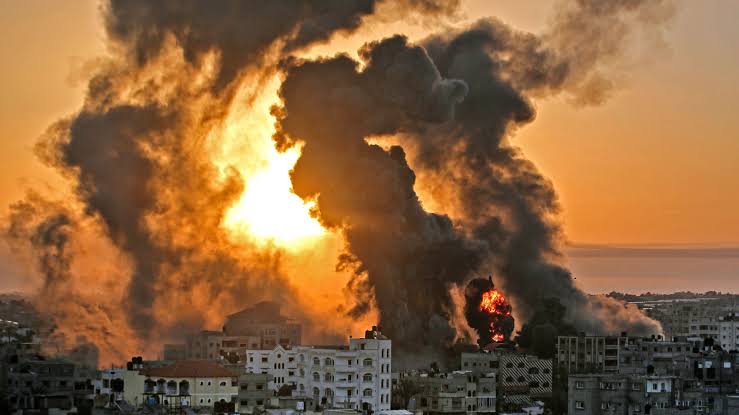Relentless rocket fire and rioting in mixed Jewish-Arab towns fuelled growing fears Wednesday that violence between Israel and Palestinians that has claimed 50 lives could spiral into "full-scale war".
More than 1,000 rockets have been fired by Palestinian militants, Israel says.
Of these, 850 rockets have hit in Israel or been intercepted by Israel's Iron Dome air defence system, while the rest have crashed inside Gaza, he said.
Israel has carried out hundreds of air strikes on Gaza, destroying three tower blocks and killing senior Hamas officials.
The most intense hostilities in seven years have killed at least 43 people in Gaza, including 13 children, two Palestinians in the West Bank, and five Israelis, triggered by weekend unrest at Jerusalem's Al-Aqsa mosque compound, which is sacred to both Muslims and Jews.
On the Israeli side, more than 100 people have been injured, as residents across the Jewish state have been ordered to seek shelter.
Prime Minister Benjamin Netanyahu said the government would use all its strength to protect Israel from enemies on the outside and rioters on the inside.
He has also declared a state of emergency in the mixed Jewish-Arab Israeli city of Lod, where police said "wide-scale riots erupted among some of the Arab residents".
What caused the violence?
The fighting between Israel and Hamas was triggered by days of escalating clashes between Palestinians and Israeli police at a holy hilltop compound in East Jerusalem.
The site is revered by both Muslims, who call it the Haram al-Sharif (Noble Sanctuary), and Jews, for whom it is known as the Temple Mount. Hamas demanded Israel remove police from there and the nearby predominantly Arab district of Sheikh Jarrah, where Palestinian families face eviction by Jewish settlers. Hamas launched rockets when its ultimatum went unheeded.
Related Articles
Palestinian anger had already been stoked by weeks of rising tension in East Jerusalem, inflamed by a series of confrontations with police since the start of the Islamic holy month of Ramadan in mid-April.
It was further fuelled by the threatened eviction of Palestinian families from their homes in East Jerusalem by Jewish settlers and Israel's annual celebration of its capture of East Jerusalem in the 1967 Middle East war, known as Jerusalem Day.
The fate of the city, with its deep religious and national significance to both sides, lies at the heart of the decades-old Israel-Palestinian conflict. Israel in effect annexed East Jerusalem in 1980 and considers the entire city its capital, though this is not recognised by the vast majority of other countries.
Palestinians claim the eastern half of Jerusalem as the capital of a hoped-for state of their own.
World Powers and International Bodies React
As world powers voiced growing alarm and the UN Security Council readied for another emergency meeting on the bloody crisis, the UN Middle East envoy Tor Wennesland warned that "we're escalating towards a full-scale war".
"Leaders on all sides have to take the responsibility of de-escalation," he said, echoing warnings from the international community.
British Prime Minister Boris Johnson on Wednesday urged Israel and the Palestinians to "step back from the brink", calling for both sides to "show restraint".
The chief prosecutor of the International Criminal Court, Fatou Bensouda, voiced concern at the escalation of violence and said "crimes" may have been committed.
Bensouda announced on March 3 that she had opened a full investigation into the situation in the Israeli-occupied territories, infuriating Israel, which not a member of The Hague-based court.








